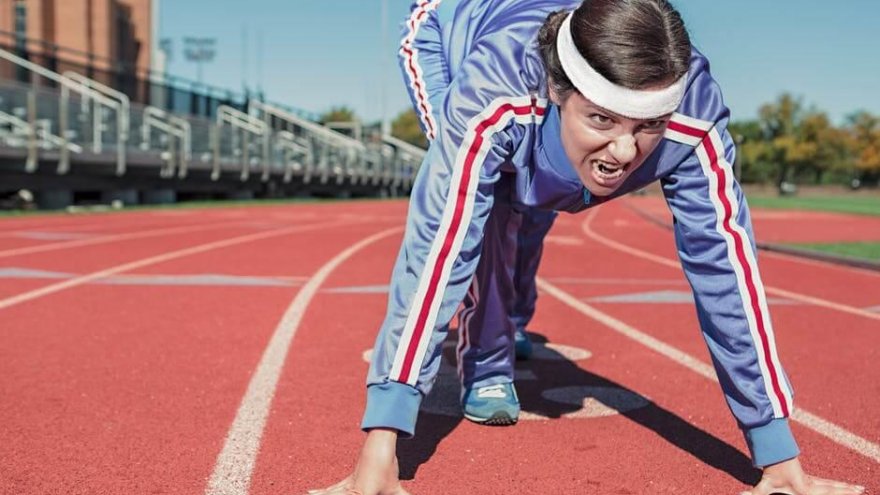The Role of Stress in Running Performance

Have you ever had the experience where you’ve been totally eelaxed with low expectations and then had the best race of your life? Running can thrive when it’s free of pressure and anxiety. This can be especially true for high-profile elite athletes who have a lot of pressure on them. There are the few unique individuals who thrive on race-day pressure, but as a whole, most people find that too much stress hinders their performance.
It’s widely known that chronic sustained stress can wreak havoc on the body. That’s why most runners incorporate rest or cross-training days into their routine. There’s some debate on how much physiological stress is beneficial on race day. There seems to be a fine line between being too amped up and being under-stimulated when it comes to racing performance.
Stress in itself is a fairly complex concept. The human body naturally experiences stress when it cannot find adequate food, water, and shelter. Runners often experience a variety of training and racing weather conditions, and extreme warm and cold climates add additional stress to the body’s ability to efficiently process physical activity. During a race, inadequate fueling or hydration is one of the leading causes of concern for stress on the system, especially in longer races. Physiological stress can also occur when athletes are not getting enough electrolytes and nutrients from their diet while they are training.

Inadequate rest/recovery between training sessions can also be a problem for runners and triathletes who are incorporating more than one workout per day. Runners often lose sleep prior to race day, and athletes who are parents or have a demanding work schedule will sacrifice sleep in order to complete their training. All of these factors can affect your overall stress level and racing performance.
Psychosocial stressors can also contribute to the overall stress load. The old saying that “running is 90% mental” is true in more than one way here. The chemicals released in the body in response to emotional stress are arguably just as powerful as those experienced during physical stress. Perfectionism has also shown to have a significant relationship with race performance. One study found that athletes performed better when they focused on beating their personal best as opposed to beating their opponents.
The general consensus is that a little bit of race day jitters are ok, and losing sleep the night before a race does not affect everyone. However, it’s universally supported in the literature that chronic physical and mental stress is detrimental to training and race performance for runners.

What can we do to avoid the consequences of repeated prolonged stress, pressure and perfectionism? Prevention is key, especially if you live in a culture that promotes a workaholic lifestyle. The first step is to determine what YOUR particular stressors may be. Is it a lack of sleep? Do you make poor food choices, or do you have a proper home-cooked diet while training? Are you staying hydrated enough? Do you find yourself constantly feeling emotionally stressed, anxious or worried? Have you buried something traumatic from your past that continually brings you anguish?
Then you must ask “Why?” and “What do I need to change?” Getting at the root of the problem is very important. For example, if you’re not getting enough quality sleep, figure out why and come up with solutions. If you find it hard to wind down at night, consider setting an alarm to remind you to end “screen time” an hour before bedtime. (The body needs time to prepare for sleep, and artificial screen lighting interferes with that process). If your schedule makes it easier to eat out while you’re on the go, prep your meals for the week on Sunday night and bring lunch to work with you. (This saves money too!) If you’re struggling with anxiety or depression, don’t go it alone – find professional help.
Setting up a priority list is helpful. We only get one body, and many people end up hitting rock bottom with physical burn-out before they begin to re-prioritize taking care of themselves. Prevention is a much better way to go. It often takes sacrifices in one area to take care of your body as an athlete, but your overall well-being and race day performance will thank you if you find ways to identify and eliminate your chronic stressors.

General tips to reduce physiological stress
-Ensure the basics: enough sleep, a well-balanced diet, and good hydration. Make sure you are getting enough vitamins, minerals, and natural antioxidants. (Your doctor can test these levels and recommend supplements if needed).
-Be flexible in your training plan and allow for a modification of a workout if your body isn’t feeling up for it. Listen to your body! And definitely incorporate rest/recovery days.
-Train for race day. If your race is in Death Valley and you live in Alaska, your body will have a lot harder time adapting, so you may want to do some indoor runs with extra layers to get used to running overheated. If you can’t train in a way that mimics your race, try to get there several days early to help your body adapt to climate stress.
-Expect the unexpected. The more likely you are able to shrug off or laugh about a mildly rolled ankle or head cold on race day, the less chemical stressors to negatively impact your performance. (But also, be smart about pushing through pain).

General tips to reduce psychological stress
-Choose what to focus on to reduce stress. Make your thoughts positive and set your goals based on how you want to perform against your own prior performances, and not necessarily on the person next to you (unless you know that you’re one of those people who thrives off external goals and pressure).
-Make time for daily meditation, yoga, breathing exercises, prayer, journaling, visualization exercises, blogging or whatever else may help you manage psychological stress.
-Make sure you have a support system in place, whether that be a spouse, friends, a coach, therapist, training group, or other types of social support. If you’re feeling overwhelmed, lean on those in your inner circle to help find healing and motivation.
-Laughter is the best medicine. Make sure you’re slowing down enough to smell the roses and laugh a little! Try not to take life or race performance too seriously!
Do you have any other stress relief tips? We’d love for you to comment and share!
Latest Articles
 Is Running on a Treadmill Easier Than Running Outside?Runners have their own preferences, whether it is treadmill running, running outside on the road, or exploring trails. So...
Is Running on a Treadmill Easier Than Running Outside?Runners have their own preferences, whether it is treadmill running, running outside on the road, or exploring trails. So... Is It OK to Use Trail Running Shoes on the Road?While trail running shoes can be used on roads, especially in situations where a runner encounters mixed terrains or pref...
Is It OK to Use Trail Running Shoes on the Road?While trail running shoes can be used on roads, especially in situations where a runner encounters mixed terrains or pref... How to Fix Sore Quads After Running?Rest, ice, gentle stretching, and over-the-counter pain relievers can help soothe sore quads after running. Also, ensure ...
How to Fix Sore Quads After Running?Rest, ice, gentle stretching, and over-the-counter pain relievers can help soothe sore quads after running. Also, ensure ... 10 Fruits With The Most Electrolytes to Replace Sports DrinksThese fruits are high in electrolytes such as potassium, magnesium, and calcium, essential for hydration, muscle function...
10 Fruits With The Most Electrolytes to Replace Sports DrinksThese fruits are high in electrolytes such as potassium, magnesium, and calcium, essential for hydration, muscle function...

